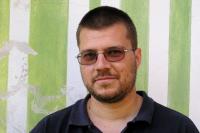


Peter Kerekes: 107 Mothers

2017, on this site: High expectations. What else can you have with a project from Slovak film director Peter Kerekes, who won a big award at the Karlovy Vary festival the other day. Let me remind you of the many innovative, entertaining and thought-provoking films by the Slovak director, who refrains from making observational documentaries, has developed his own style, as you can see in the short film “Second Chance” from 2014, “Cooking History” (2009), “66 Scenes” (2003) and “Velvet Terrorists” (2013) that he made with colleagues, among them Ivan Ostrochovsky, who is the script writer of the awarded project “Censor” with these words from the jury:
”The film centers on Irina, who works as a censor in a prison in Odessa, Ukraine. She spends eight hours a day in her office reading love letters. Through her, we follow various love affairs that only she can observe. Although she sees how women are being used, and how the relationships end in disaster for them, she cannot take any action. She is a single woman and after 12 years of reading love letters full of the lies men tell, she is not capable of any relationship. If a guy on a date says, ‘You are special,’ she feels sick. But, of course, even she dreams of love.”
2021: 4 years later the finished film premiered and the primary focus is different as you can read from Kerekes statement on the site of ”La Biennale di Venezia”, where the film had its opening in September 2021:
”From among the many stories of the women in Colony 74, I was most inspired by that of a woman who murdered her husband out of jealousy and arrived in the prison pregnant with her child. We spent several years in an actual prison with actual convicts, trying to get close to them and film them not as passive objects, but rather as participating subjects. Seeing that most of the prisoners were awaiting conditional release, or they could at any time be transferred to a different facility, I decided to cast a professional actress to portray Lesya, knowing I could not risk losing my protagonist. Maryna was present during all the preparatory interviews and spent much time with the convicts. I didn’t want her to mimic their behaviour—I wanted her to listen to them and try to understand them. I also wanted the film to deliver an authentic collective testimony of the convicted mothers, not only through their conversations with Irina but also through the silent scenes—the loneliness they feel when their children are taken away and they despairingly finish their birthday cake; the flashes of happiness when the women briefly forget they’re in prison. Visually, these scenes are treated almost like a photograph—a memory of a moment independent of space and time. »
High expectations… did Kerekes and his team succeed again? With another tone less humouristic yes, but still it is a film where you recognise the signature of a director, who constantly investigates the possibilities of the cinematic language, in this case however on the background of a story located in a prison, where women have been placed to be for years. Not so much to laugh about!
Don’t like it but IF I am to make the classic distinction between fiction and documentary, the film draws from both in terms of storytelling. There is the drama about – to simplify – Lesya (acted by Maryna) and her child Kolya, who we follow from his birth until he is 3 years old, where the regulations say that he has to leave the prison. And there is – as Kerekes himself formulates it – the ambition “to deliver an authentic collective testimony of the convicted mothers”. Not an easy combination for the director and his team (camera by Martin Kollar excellent), and apart from some moments not quite successful I have to confess. I think I reacted to a lack or stop of narrative flow, when drama is ¨going on” and then abruptly stopped by documentary scenes.
Irina and Lesya are the protagonists with strong participation of other inmates – and their children – with Kolya, Lesya’s boy as the one we follow from his birth. In heartbreaking situations, in the playroom of the prison, outside on the playground and with Irina, when she censors the letters sent to the women by their men. Irina builds a fine relation to Kolya. Lesya wants to avoid him being sent to an orphanage after she has served 3 of her 7 years, but her mother and her sister say no to take him, whereas the mother of the husband she killed says yes « on one condition… that you will not see him again ». Lesya says no, a mother has the right to see her child. Is there another solution, the film says yes at the end. No spoiling from my side !
Maryna Klimova is excellent as Lesya, she has not a lot of hope in her face and her only real reason to go on, is Kolya; evident in the acting of Maryna. You see that in her eyes, in the way she moves, the hidden anger in her voice and you see magnificent scenes celebrating Kolya’s 3 year’s birthday with cake and candles.
Anyway, expectations met? Overall a BIG YES, the balance between the fictional part based on the long research mentioned by Kerekes above and the documentary part giving the spectator an impression of the life in a prison for women in Ukraine? But judge for yourself! This film travels and will travel winning more awards. It will come to a festival near you.
Slovakia, Czech Republic, Ukraine, 2021, 93 mins.
http://www.filmkommentaren.dk/blog/blogpost/4300/ (Occupation 1968
http://www.filmkommentaren.dk/blog/blogpost/2907/ (Second Chance)
http://www.filmkommentaren.dk/blog/blogpost/724/ (Cooking History)
http://www.filmkommentaren.dk/blog/blogpost/2910/ (66 Seasons)
http://www.filmkommentaren.dk/blog/blogpost/2418/ (Velvet Terrorists)